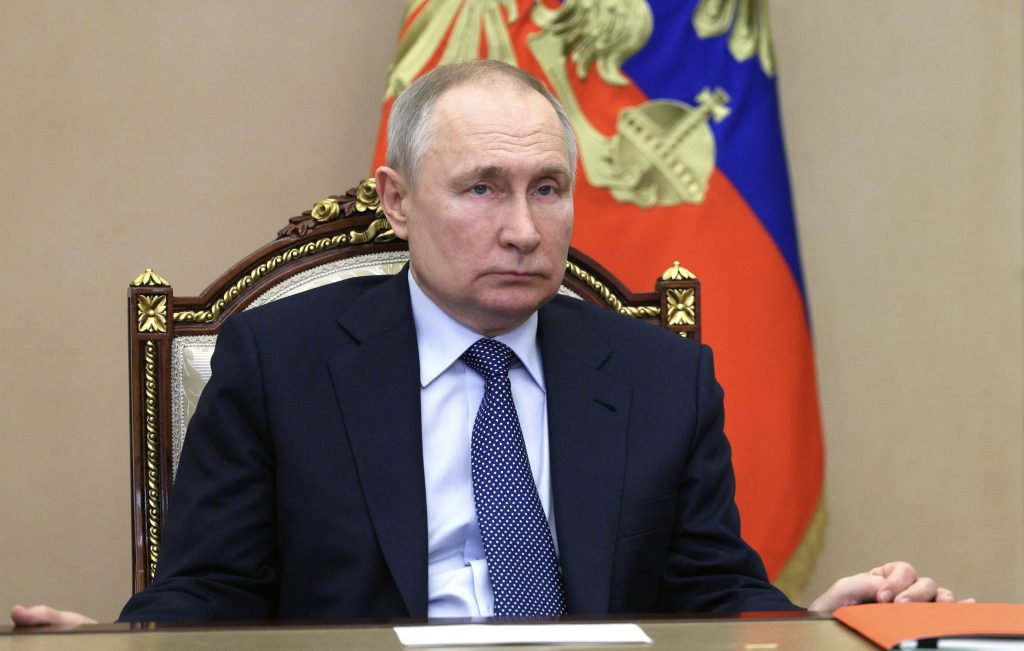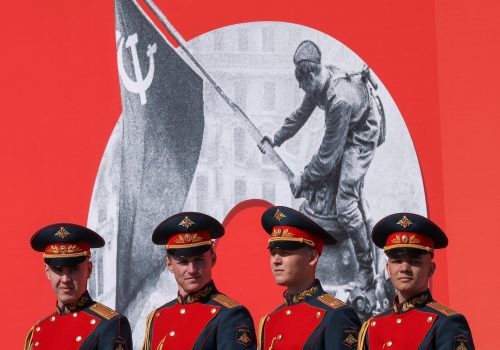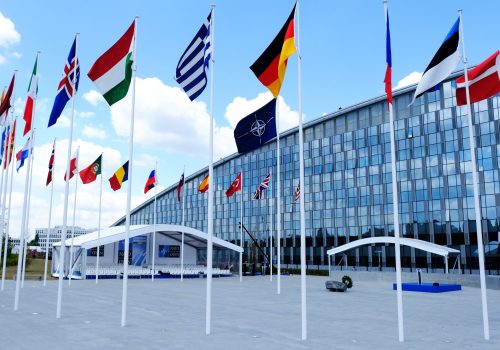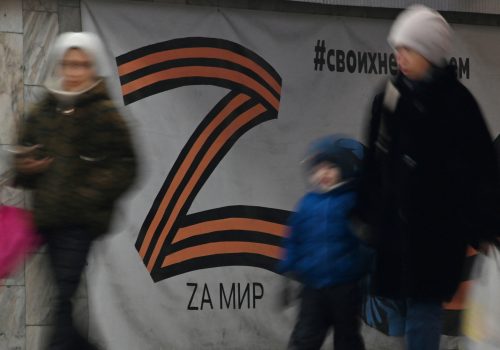With the stroke of a pen, Russian President Vladimir Putin on March 31 approved Russia’s latest foreign policy concept, its first since 2016. While Putin called the document “a basis for our practical actions in the mid-term and more distant future,” the release did not make much news beyond dedicated Russia watchers. This is in part because its cavalcade of fabrications and grievances about the world has been marched out by Putin in speeches for years. Yet this official distillation of Kremlin-approved ideas is worth reflecting on, especially for how it describes Russia itself. Doing so reveals a concerning inflection point in Russian imperial ambitions beyond Ukraine: Putin intends for Russia to contend against the West not just in terms of military power, but also in the realm of ideology.
The nine-thousand-word concept starts by describing Russia as “a unique country-civilization and a vast Eurasian and Euro-Pacific power.” It adds that Russia “brings together the Russian people and other peoples belonging to the cultural and civilizational community of the Russian world.” In the Kremlin’s formulation, then, Russia is not so much a nation-state among nation-states as it is a civilizational world unto itself. This kind of language has been used by Putin for years and is increasingly prevalent among Russia’s elite. It is used to explain the reasons for the fall of the Soviet Union and chart a course for Russia’s redemption. This redemption is the creation of a new russkiy mir—here translated as “world” but also meaning “peace.” It is a concoction designed to become Russia’s new civilization, its “Pax Russica” of sorts. Whether the new wave of Russian nationalism-cum-imperialism succeeds in defining the Russian mind will determine what the Russian Federation becomes going forward.
This shift in Russian culture may be seen as the “de-Westernization” and reconceptualization of Russia as a Eurasian state par excellence, with “Eurasia” understood in modern Russian history as an entity separate from the West—and not only separate from the West, but in a dichotomy of the West vs. Eurasia as well. It is about moving Russians’ point of reference for their country back to Russia’s pre-European era, before German administrators, Dutch ship builders, and French artists some three hundred years ago became fixtures at the Russian imperial court. This Westernizing impulse in Russia over several centuries helped the country to modernize and build a powerful military machine that would defeat the Poles, the Swedes, and, ultimately, the French and the Germans. But it was also this empire-building process that made it all but impossible for Russia to move past superficial “Westernization” and become truly Western. And so today, just like the “Europeanization” of the Russian empire was to be its rebirth in the nineteenth century, the “Eurasianization” of the Russian Federation is offered as a fundamental break with the past.
Eurasianists argue that Russian culture is sui generis and that anything that enters it from the West contaminates the Russian soul. Putin’s insistence that his war in Ukraine is civilizational and that he is defending Russia from NATO, the United States, and the collective West reflects this view. It is also a principal reason why much of the Russian population—whether overtly or tacitly—supports it. The Eurasian reorientation in Russia has reordered narratives about Russian history, with arguments about the incessant defense against evil coming from the West—be it the Poles occupying the Kremlin in 1610, the French meandering through the burning Russian capital in 1812, or the Germans standing at the gates of Moscow in 1941.
In this new Russia, with its aspirations to establish a russkiy mir, lie the drivers that will likely forge a Russia the West will need to contend with for years to come.
What “Eurasianization” means for the West
Much of the present conversation among Western policy elites about a possible course of Russia’s systemic evolution in the wake of its brutal war in Ukraine continues to retread the clichés about whether and how Russia could become more pluralist and even democratic. Failing that, the conversation turns to how Russia could at least end up with a “good tsar” to replace the detestable Putin. The problem is these and sundry desiderata have little to do with the reality of the ideological shift taking place there today.
Much has also been written about the United States and its European allies’ fears of crossing “red lines” through their supply of weapons, munitions, and humanitarian assistance that has made it possible, thus far, for Ukraine to defend itself. But the West’s reticence to provide the level of military assistance that would prove decisive on the battlefield is perhaps driven in equal part by its inability to decide on an end state in this conflict, not just when it comes to Ukraine but also Russia. The matter of Russia’s end state raises the question of how to facilitate the greatest decolonization of this century—not only in terms of territory, but also in terms of the Russian mind and culture.
If one understands that the changes taking place in Russia today are not more of the same, but in fact a civilizational inflection point, one can appreciate the inherent limitations in any accommodation with Russia contemplated by some policy elites in Western capitals. Putin wants not just to defeat the Ukrainian resistance to his invasion—he is seeking a civilizational win as a validation of Russia’s Eurasian course. The argument that he attacked Ukraine because NATO was encroaching on Russian territory fails to explain the ideological and cultural animus that permeates the Russian media, Putin’s speeches, and statements of key Russian government officials.
Moreover, the ever-closer alignment of Russia with China is not, as some pundits have opined, generated by US policy of trying to contain or even encircle Russia. Nor is it a result of NATO’s enlargement into countries of the former Warsaw Pact. The Sino-Russian alliance is in part the product of the same nationalist ferment in Russia that has been underway for several decades and is now channeled through Putin’s fixation on Russia as a Eurasian country-civilization. Putin is drawing Russia closer to China because he believes the Chinese will give Russia the heft it needs to defeat the West and establish its russkiy mir.
The United States and its NATO allies need to accept the realization that the “Russia problem” is here to stay. What the West does to help Ukraine today will determine how far east that new fault line separating Europe from Eurasia will lie. And the question is: Are the United States and its allies ready for a future in which “Eurasian Russia” faces the West in Europe for decades to come?
Andrew A. Michta is a nonresident senior fellow at the Scowcroft Strategy Initiative in the Atlantic Council’s Scowcroft Center for Strategy and Security. He is also dean of the College of International and Security Studies at the George C. Marshall European Center for Security Studies in Garmisch, Germany.
The opinions expressed here are those of the author and do not reflect the official policy or position of the George C. Marshall European Center for Security Studies, the US Department of Defense, or the US government.
Further reading
Wed, Feb 22, 2023
Russia policy after the war: A new strategy of containment
New Atlanticist By Alexander Vershbow
To prevent further damage to the rules-based international order, the United States and its allies will need a strategy of containment to deter Russia militarily and decouple Russia from the international community, until Moscow has earned the right to be considered a partner once more.
Thu, Apr 13, 2023
Memo to NATO leaders
Memo to... By
NATO’s upcoming Vilnius summit has to produce more than a rhetorical expression of support for Ukraine. Allied leaders must leverage the opportunity to drive forward a NATO defense and deterrence posture that underscores NATO’s resolve to support Ukraine and begins the process of fully integrating Ukraine within the transatlantic community, including as a NATO member.
Tue, May 2, 2023
How strong is Russian public support for the invasion of Ukraine?
UkraineAlert By
The Kremlin has worked hard to create the impression of overwhelming public support for the invasion of Ukraine but it remains difficult to gauge true levels of pro-war sentiment in today's Russia, writes Sviatoslav Hnizdovskyi.
Image: Russian President Vladimir Putin chairs a meeting with members of the Security Council via a video link in Moscow, Russia, March 31, 2023.



